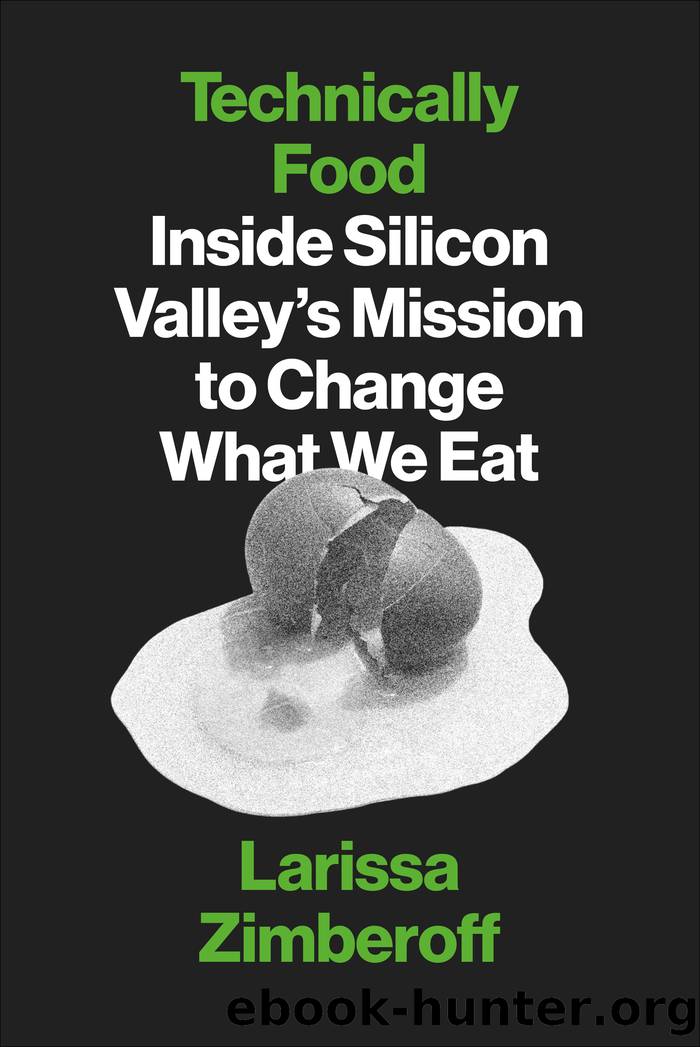Technically Food by Larissa Zimberoff

Author:Larissa Zimberoff
Language: eng
Format: epub
Publisher: Abrams
Published: 2021-06-01T00:00:00+00:00
The Brown of Beyond
Compared with Impossible Foodsâ high-tech Stanford allure, Beyond Meat feels like something that began in a garage down the street. Its headquarters are located in El Segundo, California, a coastal town better known for its refineries and a song by A Tribe Called Quest. Beyond is the startup with the second-biggest IPO valuation in the last decade, although Airbnb and DoorDash came close in 2020.
Ethan Brown (no relation to Pat from Impossible) is a towering ex-jock who spent weekends on his familyâs dairy farm in Maryland. Armed with an MBA from Columbia University, and some work experience in clean energy, Brown, also a vegan, wanted to prove that âyou didnât need an animal to produce meat.â He combed through research papers to find a technology that might work for his mission, and launched his companyâinitially called Savage River, after his familyâs farmâin 2009.
In the early days, Brown worked with Dr. Martin Lo, a food scientist and former professor from the University of Maryland, his alma mater. First up was vegetarian âchicken.â The pair hoped to replicate the stringy protein fibers that ribbon through chicken meat. But it wasnât easy. In an alumni magazine, Lo reported: âThe first generation of the product was like a broken tire torn apart.â
When he finally had a product he felt good about, Brown spent hours on his feet handing out samples in grocery stores throughout the Midwest. âWomen would come up to me and ask, âHow do I get my husband to eat this?ââ Brown told me in one of our many interviews, both in person and on the phone. He also fed it to his family, including his teenage son, who, he said, eats multiple Beyond burgers every week.
Beyond burgers are produced in a multi-step process of heating, cooling, and pressure, which re-stiches the plant fibers together. It takes two minutes to make a burger this way, or fourteen months to raise an animal. This length of time is crucial to these foundersâ save-the-environment platform. They like to point out how inefficient animals are at converting energy into human caloriesâit takes 23 calories of input for a cow to convert into 1 human calorie. (For reference, chicken is the most efficient at 9 calories in for 1 calorie out.)
One big problem with the efficiency argument is that it works against plants. Spinach takes six weeks to grow. A tomato takes three months. Are we sleepwalking toward a future in which future foods must be harvestable faster than their traditional counterparts? Will it ever get to the point that someday we are led to reject any food that takes longer than a few minutes to grow or make?
The plant-based debate is sure to rage on, with a range of companies churning out their own iterations of burgers and nuggets, but calling these things plants is like calling a Slim Jim meat. While I make this comparison a bit off the cuff, when I looked up what goes into a Slim Jim jerky stick I was pretty horrified.
Download
This site does not store any files on its server. We only index and link to content provided by other sites. Please contact the content providers to delete copyright contents if any and email us, we'll remove relevant links or contents immediately.
Zero to IPO: Over $1 Trillion of Actionable Advice from the World's Most Successful Entrepreneurs by Frederic Kerrest(4570)
Machine Learning at Scale with H2O by Gregory Keys | David Whiting(4313)
Never by Ken Follett(3957)
Harry Potter and the Goblet Of Fire by J.K. Rowling(3857)
Ogilvy on Advertising by David Ogilvy(3622)
Shadow of Night by Deborah Harkness(3368)
The Man Who Died Twice by Richard Osman(3079)
Book of Life by Deborah Harkness(2939)
The Tipping Point by Malcolm Gladwell(2922)
Will by Will Smith(2920)
Purple Hibiscus by Chimamanda Ngozi Adichie(2855)
0041152001443424520 .pdf by Unknown(2846)
My Brilliant Friend by Elena Ferrante(2831)
How Proust Can Change Your Life by Alain De Botton(2814)
How to Pay Zero Taxes, 2018 by Jeff A. Schnepper(2655)
Hooked: A Dark, Contemporary Romance (Never After Series) by Emily McIntire(2554)
Rationality by Steven Pinker(2365)
Can't Hurt Me: Master Your Mind and Defy the Odds - Clean Edition by David Goggins(2341)
Borders by unknow(2315)
